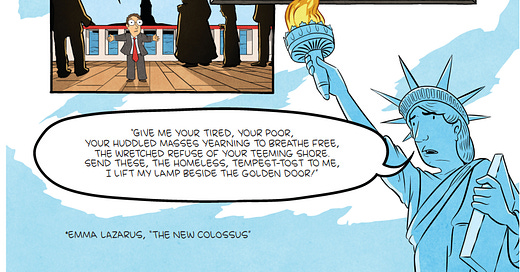
What did Milton Friedman think about open borders? The word “immigration” doesn’t even appear in Capitalism and Freedom (1962). In 1999, he famously/infamously declared, “You cannot simultaneously have free immigration and a welfare state.” But Free to Choose (1980) features the following ode to open borders while it lasted. Although Friedman never seems to grasp the Clemensian insight that big international skill-adjusted wage gaps imply astronomical foregone global gains, he definitely accepted that open borders once enriched both immigrants and natives.
Modern critics of immigration — even Mark Krikorian — normally concede that immigration is good for the immigrants themselves. Back in 1980, however, Free to Choose still found it necessary to rebut the Marxist idea that immigrant workers (even more so than native workers!) were victims of capitalist exploitation.
Go get ready for some classic Friedman. Milton, though I only met you once, I miss you.
Until after World War I immigration was almost completely free (there were restrictions on immigration from the Orient). As the Statue of Liberty inscription has it:
Give me your tired, your poor,
Your huddled masses yearning to breathe free,
The wretched refuse of your teeming shore.
Send these, the homeless, tempest-tossed to me:
I lift my lamp beside the golden door.They came by the millions, and by the millions they were absorbed. They prospered because they were left to their own devices.
A myth has grown up about the United States that paints the nineteenth century as the era of the robber baron, of rugged, unrestrained individualism. Heartless monopoly capitalists allegedly exploited the poor, encouraged immigration, and then fleeced the immigrants unmercifully. Wall Street is pictured as conning Main Street, as bleeding the sturdy farmers in the Middle West, who survived despite the widespread distress and misery inflicted on them.
The reality was very different. Immigrants kept coming. The early ones might have been fooled, but it is inconceivable that millions kept coming to the United States decade after decade to be exploited. They came because the hopes of those who had preceded them were largely realized. The streets of New York were not paved with gold, but hard work, thrift, and enterprise brought rewards that were not even imaginable in the Old World. The newcomers spread from east to west. As they spread, cities sprang up, ever more land was brought into cultivation. The country grew more prosperous and more productive, and the immigrants shared in the prosperity.

















Everyone wants to be in the USA. Why? Is there something special about the geography? Is there something immutable about this place that will make it forever superior to the alternatives? No. It's the culture and institutions. Ours are better than those of other places. What makes it better is contained in the culture, which is the minds of the people who are here. Our institutions and cultural norms are not set in stone and can be changed in a generation or less if the people will it so. With no borders, it's just a matter of time until the entire world is a monoculture. If you accept my premises above, that the culture and institutions of the US are superior, averaging us into a monoculture with the rest of the world must make us worse. It stands to reason we should only allow people in here who will enhance and improve our culture in its uniquely American way.
A more cynical view is that our best days are behind us and we are just fighting over who gets to loot the previously accumulated wealth. This doesn't seem so far from the truth in western Europe.
And on a completely unrelated note, any theory of immigration must have enough nuance to explain why Israeal should not have open borders, unless you can make the case that doing so would not be suicidal for them.
“Give me your tired, your poor,
Your huddled masses yearning to breathe free,
The wretched refuse of your teeming shore.
Send these, the homeless, tempest-tossed to me:
I lift my lamp beside the golden door.”
Thanks, not enough attention is given these days to the 0th amendment to the constitution that you quote here. The ratification process was a bit unconventional, but it’s right there on the statue so it’s binding.
But you neglected the second clause, which dictates that, in addition to preventing us from ever stopping any one of the 8 billion american pre-citizens from moving here, nobody is allowed to complain about it, which necessarily takes precedence over the 1st and any other amendments.